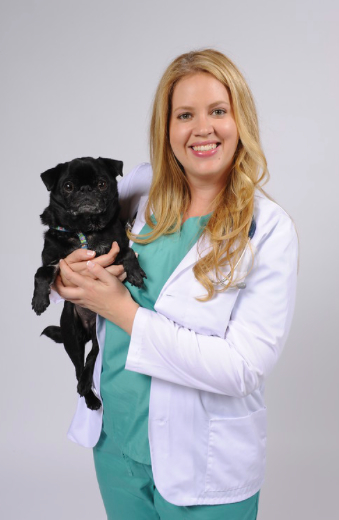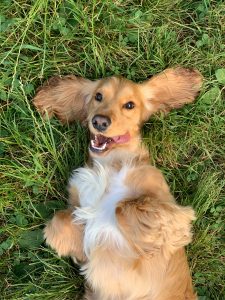
You’ve probably heard them: those sometimes loud gurgling noises coming from your four-legged friend’s belly. Sometimes your dog might act uncomfortable, stretching out like a cat (or what’s known in yoga as Downward-Facing Dog). Perhaps he stops eating, or you see him eating grass. Sometimes your pup might act like nothing is wrong at all. Should you be concerned when you hear your dog's stomach gurgling? Here’s what to know.
What are gut sounds?
The noises you’re hearing come from your dog’s gastrointestinal tract. The medical term for these sounds is Borborygmi, and what’s happening is gas is moving through the intestines. The amount of gas depends on how the normal bacteria in the colon are working on breaking down undigested food. Amounts of gas vary depending on the individual dog, diet, and when the last time food was consumed.
It is normal for the intestine to contain gas, yet sometimes it can move rapidly to the large intestine (colon).
Are loud gut sounds in dogs normal?
Sounds from a dog’s abdomen in most cases are not concerning and can occur as part of the normal digestion process. The gut will also make noise when hungry. Peristalsis occurs after ingestion of food, but also more frequently after a dog’s stomach has been empty for about two hours.
When a dog (or human) is hungry, signals from the brain tell the digestive organs to prepare for a meal. Many dogs may have an increase in gut sounds in the morning before they have had a meal, or if they have been fasting for many hours.
Dogs often can ingest too much gas, too, which can also lead them to have increased Borborygmi.
You may notice more noise in the summer, too. Panting due to heat and exercise can cause an accumulation of gas in the gastrointestinal tract. Eating and drinking very rapidly can also cause increased gas.
If your dog seems to be feeling well and has no other abnormal clinical signs, the noises you hear are normal and not causing any pain or discomfort.
When is the noise a concern?
Excessive gas in the gastrointestinal tract causes louder or more frequent gut sounds—and it can lead the intestine to have increased activity and contractions.
If your dog’s gut sounds increase in frequency or volume (perhaps you can hear them from across the room), or if your dog shows additional signs of distress, you should consult your veterinarian.
Gut sounds are definitely a concern when they are associated with other clinical signs as gastrointestinal upset is present. These signs include:

There are many potential issues or diseases that can cause loud gut sounds accompanied by the clinical signs mentioned above. After a physical exam, your veterinarian may recommend tests such as blood work, urinalysis, or imaging of the abdomen to find out why your dog is exhibiting these signs.
Note: Dietary indiscretion (when your dog eats something they shouldn’t) is one of the most common causes of increased gut sounds in dogs. When the gastrointestinal tract is exposed to something that irritates it—it could be a new food, chew stick, soil, all the countless things dogs like to get into—it will work extra hard to break what has been ingested down. This causes an upset stomach for your pup, as well as gastroenteritis (inflammation of the stomach and intestines), which leads to excess contraction of the intestines. This can then create even more noise from the abdomen. In most situations, gastroenteritis will be mild and often responds to a bland diet and supportive, veterinarian-prescribed care such as anti-nausea or anti-diarrheal medications.
Sometimes dogs consume a toxic substance or something that may cause a blockage in the gastrointestinal tract. There are many toxins dogs can get into, for example, including grapes, raisins, chocolate and human medications. An obstruction of the gastrointestinal tract is also very serious, and in some cases requires emergency surgery to remove the foreign object as it can be life threatening.
When the foreign object becomes anchored in the stomach or intestines, the intestines will try to work extra hard to move this object down the gastrointestinal tract. This will lead to excessive peristalsis—which leads to loud, frequent gut sounds.
Inflammation of the pancreas, or pancreatitis, causes digestive issues that can also lead to excessive Borbyrgmi. The role of the pancreas is to produce enzymes (substances which cause a chemical reaction) that are important in digestion. Pancreatitis in dogs can occur from dietary indiscretion, such as consumption of a fatty meal. Some breeds such as the Miniature Schnauzer and Miniature Poodle, have a genetic predisposition to developing pancreatitis more frequently than other breeds.
Inflammatory bowel disease (IBD) can also lead to abnormal contractions of the intestines. This occurs due to the immune system producing abnormal cells that damage the delicate walls of the intestine. Loud gut sounds, vomiting, diarrhea and weight loss are often seen.
 Is there anything I can give my dog for loud gut sounds?
Is there anything I can give my dog for loud gut sounds?
An increase in noise alone does not require any medications or treatment. Check with your vet before administering any medications.
Supplements can sometimes be helpful in supporting your pup's overall health. Those containing prebiotics and probiotics can help maintain healthy gut bacteria—otherwise known as the microbiome. If the microbiome is unbalanced, this may lead to excessive gas in the intestines. Prebiotics are sources of fiber that help with the growth of the good bacteria. Probiotics are the actual live bacteria that are a normal component of the microbiome, in the form of a supplement. These bacteria bind to the cells in the intestines, causing them to release compounds that aid in proper digestion.
What can I do to prevent my dog from having excessive gut sounds?
Nutrition plays a critical role in ensuring your dog has normal digestive health. Finding a high quality food that works for your dog can be difficult. In most cases, veterinarians recommend commercial dog food over home-cooked diets to ensure that all the vital nutrients dogs need are included in the food.
Staying consistent with the chosen diet is important, too. Changing diets too frequently can lead to indigestion. Instead, transition your pup to his new food by adding small amounts to his old food over a period of at least a few weeks. Anytime something out of the normal diet is consumed--whether table scraps, treats, chew sticks or something you did not want your dog to get into—you’ll likely hear gut sounds (or even see your pup eat grass).
If your dog develops vomiting or diarrhea, you can try to feed a bland diet of boiled chicken breast and white rice (with no additives) as long as your dog does not have related food allergies. If constipation is an issue, some dogs may do better on a high fiber diet. Adding canned pumpkin to the normal dog food can also help.
If your dog excessively pants while exercising, you may want to take intermittent breaks so gas does not accumulate in the gastrointestinal tract. For dogs that eat too quickly, moistening food, splitting meals, or using food toys can help slow things down. Of course, the best way to keep your dog’s tummy healthy (and quiet) is to ensure regular veterinary visits to screen your dog for any potential diseases if the suspicion may arise.
~~~ Photos: Feature image: Benjamin Ilchmann, Unsplash Spaniel in grass: Ralu Gal, Unsplash Dachsund: Ilona Froehlich, Unsplash Resources: Brooks, Wendy. “Inflammatory Bowel Disease in Dogs and Cats - Veterinary Partner.” Veterinary Information Network, Jan. 2001. Brooks, Wendy. “Pancreatitis in Dogs - Veterinary Partner.” Veterinary Information Network, Jan. 2006.


